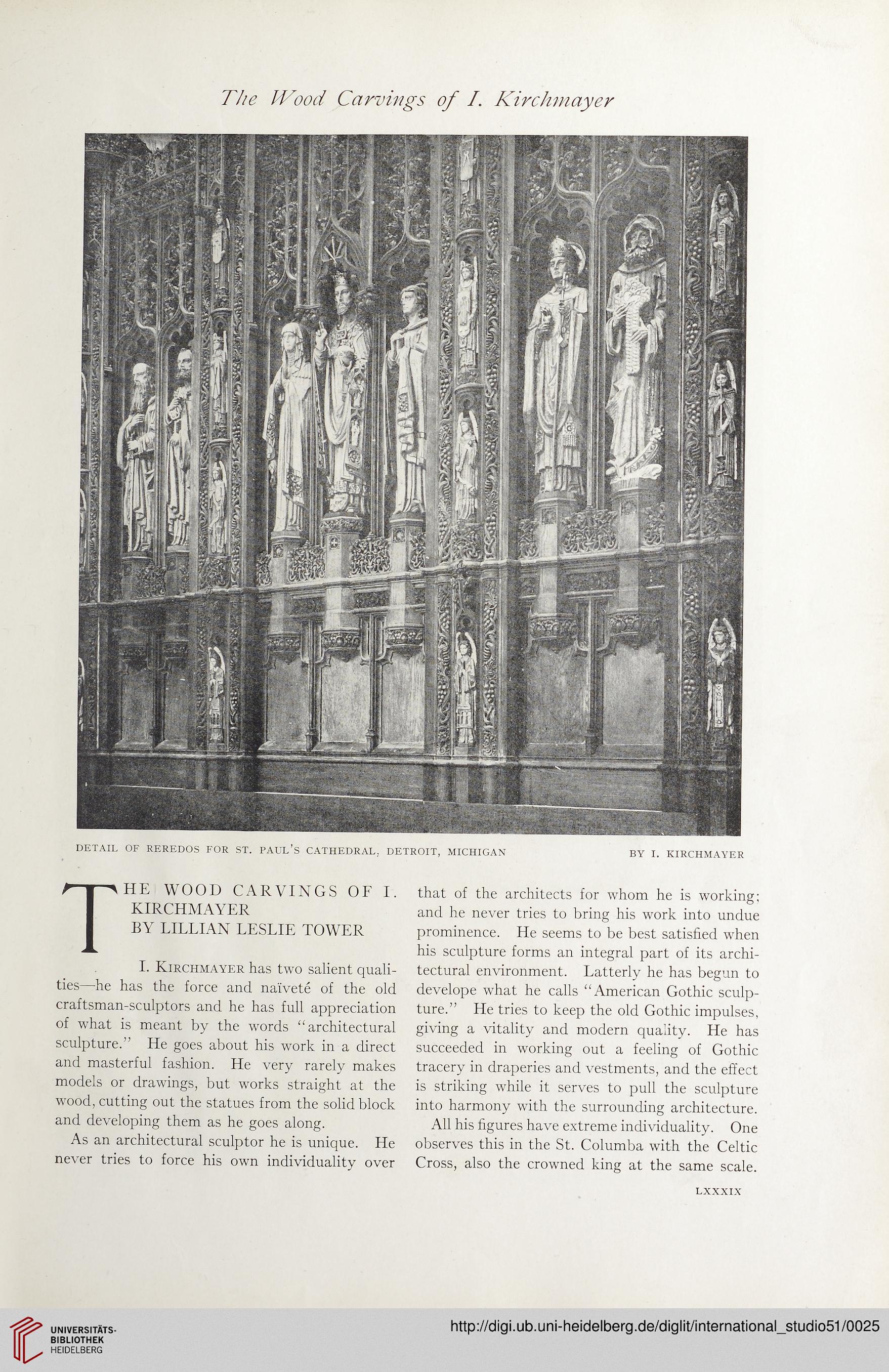International studio — 51.1913/1914
Zitieren dieser Seite
Bitte zitieren Sie diese Seite, indem Sie folgende Adresse (URL)/folgende DOI benutzen:
https://doi.org/10.11588/diglit.43454#0025
DOI Heft:
Nr. 201 (November, 1913)
DOI Artikel:Tower, Lillian Leslie: The wood carvings of I. Kirchmayer
DOI Seite / Zitierlink:https://doi.org/10.11588/diglit.43454#0025
The Wood Carvings of I. Kirchmayer
DETAIL OF REREDOS FOR ST. PAUL’S CATHEDRAL. DETROIT, MICHIGAN BY I. KIRCHMAYER
The wood carvings of i.
KIRCHMAYER
BY LILLIAN LESLIE TOWER
I. Kirchmayer has two salient quali-
ties—he has the force and naivete of the old
craftsman-sculptors and he has full appreciation
of what is meant by the words “architectural
sculpture.” He goes about his work in a direct
and masterful fashion. He very rarely makes
models or drawings, but works straight at the
wood, cutting out the statues from the solid block
and developing them as he goes along.
As an architectural sculptor he is unique. He
never tries to force his own individuality over
that of the architects for whom he is working:
and he never tries to bring his work into undue
prominence. He seems to be best satisfied when
his sculpture forms an integral part of its archi-
tectural environment. Latterly he has begun to
develope what he calls “American Gothic sculp-
ture.” He tries to keep the old Gothic impulses,
giving a vitality and modern quality. He has
succeeded in working out a feeling of Gothic
tracery in draperies and vestments, and the effect
is striking while it serves to pull the sculpture
into harmony with the surrounding architecture.
All his figures have extreme individuality. One
observes this in the St. Columba with the Celtic
Cross, also the crowned king at the same scale.
LXXXIX
DETAIL OF REREDOS FOR ST. PAUL’S CATHEDRAL. DETROIT, MICHIGAN BY I. KIRCHMAYER
The wood carvings of i.
KIRCHMAYER
BY LILLIAN LESLIE TOWER
I. Kirchmayer has two salient quali-
ties—he has the force and naivete of the old
craftsman-sculptors and he has full appreciation
of what is meant by the words “architectural
sculpture.” He goes about his work in a direct
and masterful fashion. He very rarely makes
models or drawings, but works straight at the
wood, cutting out the statues from the solid block
and developing them as he goes along.
As an architectural sculptor he is unique. He
never tries to force his own individuality over
that of the architects for whom he is working:
and he never tries to bring his work into undue
prominence. He seems to be best satisfied when
his sculpture forms an integral part of its archi-
tectural environment. Latterly he has begun to
develope what he calls “American Gothic sculp-
ture.” He tries to keep the old Gothic impulses,
giving a vitality and modern quality. He has
succeeded in working out a feeling of Gothic
tracery in draperies and vestments, and the effect
is striking while it serves to pull the sculpture
into harmony with the surrounding architecture.
All his figures have extreme individuality. One
observes this in the St. Columba with the Celtic
Cross, also the crowned king at the same scale.
LXXXIX




